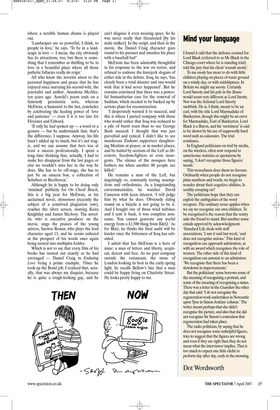Mind your language
I found it odd that the defence counsel for Lord Black (referred to as Mr Black in the Chicago court where he is standing trial) told the jury that his client ‘sounds snotty’.
To me snotty has more to do with little children playing on pieces of waste ground on a windy day, or with midshipmen. In Britain we might say snooty. Certainly Lord Snooty and his pals in the Beano would seem very different as Lord Snotty. Nor was the fictional Lord Snooty snobbish. He is, I think, meant to be an earl, with the title Lord Marmaduke of Bunkerton, though this might be an error for Marmaduke, Earl of Bunkerton. Lord Black is a Baron, and his ‘snottiness’ is said to be shown by his use of supposedly hard word such as calumnies. The trial continues.
In England politicians on trial by media, on the wireless, often now respond to unwelcome statistics or quotations by saying, ‘I don’t recognise those figures/ words.’ This weaseliness does them no favours. Ordinarily when people do not recognise plain numbers and words, we begin to wonder about their cognitive abilities. Is senility creeping on?
The politicians hope that they can exploit the ambiguities of the word recognise. The ordinary sense applies when we say we recognise our own children. To be recognised is the reason that the sentry asks the friend to stand. But another sense entails approval by acknowledgment. ‘Standard Life deals with staff associations,’ I saw it said last week, ‘and does not recognise unions.’ This kind of recognition can approach admiration, as with an award which recognises the role of women. The other side of this kind of recognition can amount to an admission: ‘We recognise that there has been a slowdown in improvements.’ But the politicians’ sense borrows some of the meaning of recognising a portrait, and some of the meaning of recognising a status. There was a letter in the Guardian the other day that said: ‘I do not recognise the regeneration work undertaken in Newcastle upon Tyne in Simon Jenkins’ column.’ The writer meant perhaps that she didn’t recognise the picture, and also that she did not recognise Sir Simon’s contention that regeneration had taken place.
The radio politician, by saying that he does not recognise some unhelpful figures, tries to suggest that the figures are wrong and even if they are right then they do not mean what the interviewer implies. That is too much to expect one little cliché to perform day after day, early in the morning.
Dot Wordsworth


































































 Previous page
Previous page